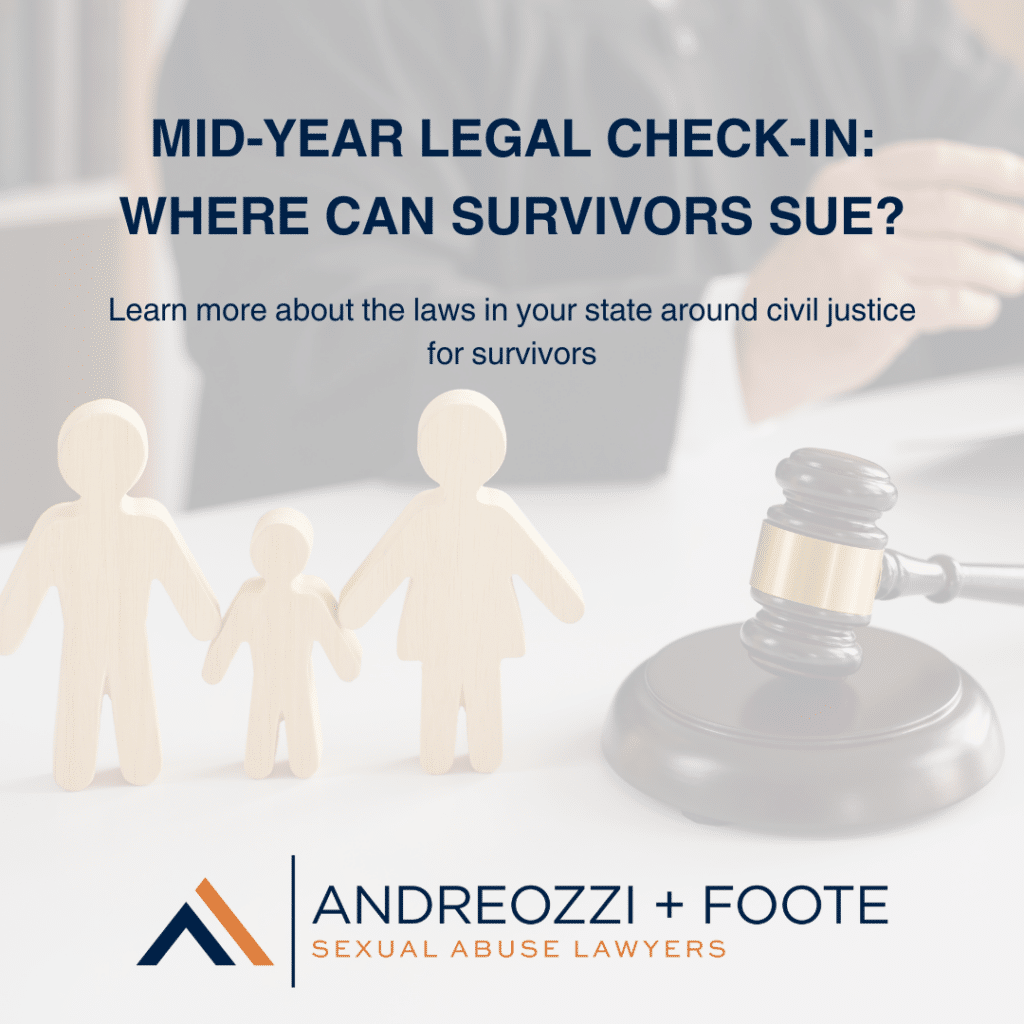As we reach the midpoint of 2025, the landscape of child sexual abuse civil litigation is shifting dramatically and survivors across the country are finally gaining legal ground. But the truth remains: your right to file a civil lawsuit still depends on where you live.
At Andreozzi + Foote, we’re tracking these legal reforms in real time because they directly impact survivors’ access to justice. This Pride Month and beyond, we recommit to fighting for every survivor especially those still locked out by outdated laws.
Here’s where statute of limitations (SOL) reform stands across the country, as of mid-2025:
States with No Civil Statute of Limitations for Some or All Child Sexual Abuse Claims
According to CHILD USA, 19 states, 2 U.S. territories, and the federal government have eliminated the civil statute of limitations entirely for some or all child sexual abuse claims. That means survivors in these states can file a civil lawsuit at any time, regardless of how long ago the abuse occurred:
- Arkansas
- Alaska
- Arizona
- California
- Colorado
- Connecticut
- Delaware
- Florida
- Illinois
- Louisiana
- Maine
- Maryland
- Minnesota
- Nebraska
- Nevada
- New Hampshire
- Utah
- Vermont
- Washington
- Federal system
- Guam
- Northern Mariana Islands (NMI)
This growing list reflects the national recognition that trauma often delays disclosure and survivors should not be punished for that.
States That Have Opened Revival or “Look back” Windows for Expired Claims
In addition, 30 states, the District of Columbia, and 3 territories have passed laws allowing survivors to revive expired claims for a limited time. These revival windows allow lawsuits to be filed even after the statute of limitations would have otherwise expired.
States with revival or window laws include:
- Alabama
- Arizona
- Arkansas
- California
- Colorado
- Connecticut
- Delaware
- Georgia
- Hawaii
- Indiana
- Iowa
- Kansas
- Kentucky
- Louisiana
- Maine
- Maryland
- Massachusetts
- Michigan
- Minnesota
- Montana
- Nevada
- New Jersey
- New York
- North Carolina
- Ohio
- Oregon
- Rhode Island
- Utah
- Vermont
- West Virginia
- District of Columbia
- Guam
- Northern Mariana Islands (NMI)
Many of these laws are recent Michigan’s one-year revival window opened in 2025, following the passage of its “Justice for Survivors” legislative package. Others, like California’s extended revival window (through 2026) and Maryland’s indefinite window, are creating new paths forward for thousands of survivors.
States Where Civil SOL Reform Has Stalled
Despite this wave of progress, some states still enforce outdated statutes that prevent survivors from filing civil claims after a certain age or time period even in cases of clear institutional negligence.
These states continue to shield abusers and institutions by maintaining restrictive SOLs with no revival provisions, leaving survivors without recourse.
If you live in one of these states and are unsure about your options, we strongly urge you to contact a trauma-informed attorney. Laws change often and exceptions may apply.
Why These Reforms Matter
The importance of eliminating civil SOLs and opening revival windows cannot be overstated. These reforms:
- Give survivors time to heal before coming forward
- Expose serial abusers and patterns of institutional failure
- Empower survivors to reclaim their power and pursue justice
- Hold accountable the institutions that enabled abuse through inaction or cover-up
Speak With a Trauma-Informed Attorney
You only get one chance to tell your story in court. That’s why it’s essential to have a trauma-informed, survivor-centered legal team who understands how abuse impacts memory, trust, and healing.
At Andreozzi + Foote, we’ve helped countless survivors file civil lawsuits under newly reformed laws and we’re actively representing clients in revival window cases across the country.
If you’re a survivor of child sexual abuse, don’t wait to explore your options.
Contact us today for a free and confidential consultation.


